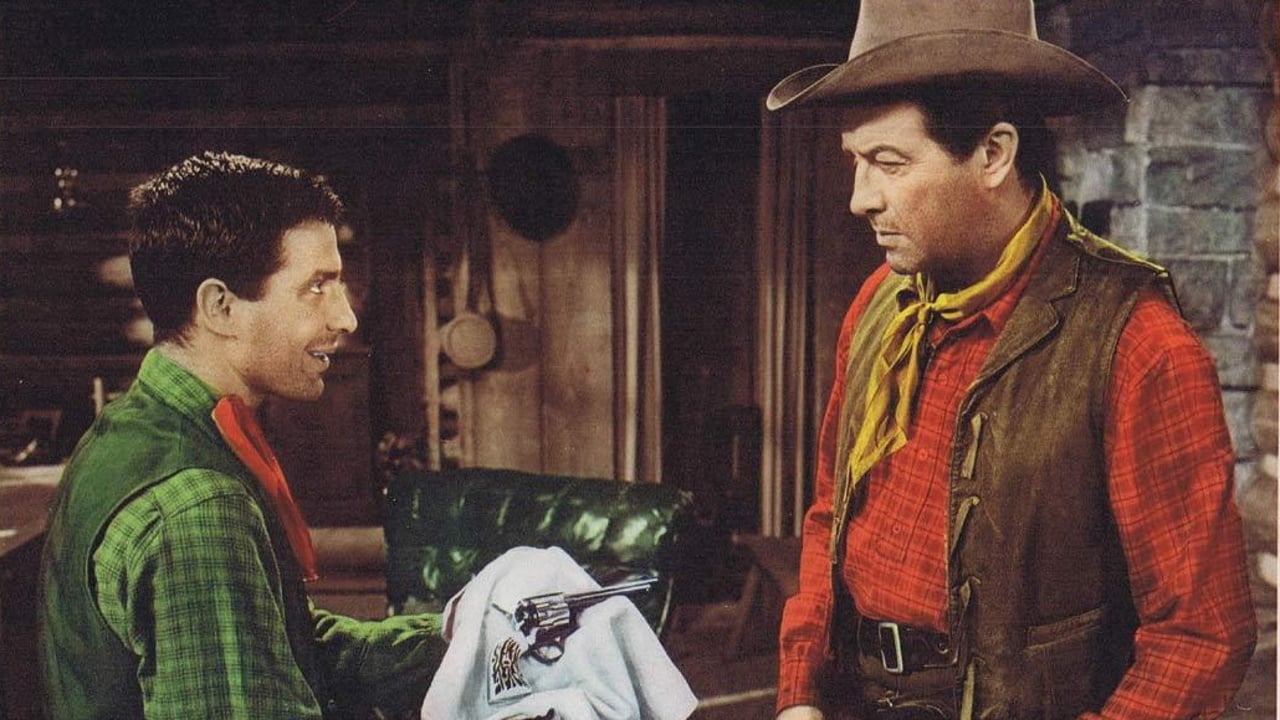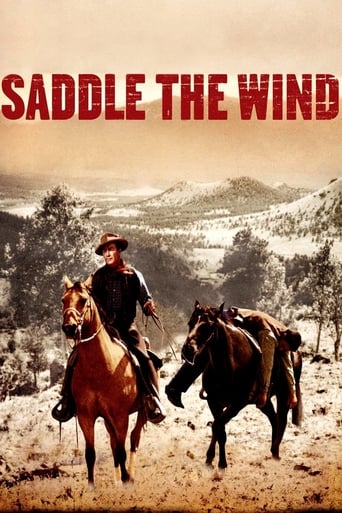StunnaKrypto
Self-important, over-dramatic, uninspired.
LouHomey
From my favorite movies..
Helloturia
I have absolutely never seen anything like this movie before. You have to see this movie.
Dana
An old-fashioned movie made with new-fashioned finesse.
MartinHafer
The casting in this film is mighty strange. The idea of John Cassavetes and Robert Taylor playing brothers just didn't seem right. Part of this was their styles of acting, part of it was because they looked nothing like each other and was they the difference in their ages was 18 years--old enough that perhaps Cassavetes would have been better cast as Taylor's son! But, as Taylor was a big-name actor, there was no way that MGM would cast the younger actor as his son.The film begins with the younger brother (Cassavetes) coming home with a woman (Julie London). They are planning on marrying and oddly Taylor doesn't do a lot to make her feel welcome. Later, when Cassavetes and London go into town, a pivotal moment arrives. A gunslinger is looking for Taylor, as years before, Taylor had been a gunman but had retired. It seemed that this gunslinger (played menacingly by Charles McGraw) is looking for a fight--and Cassavetes is more than willing to oblige. When Cassavetes manages to beat the guy to the draw, it was a fluke...but now there was a HUGE change in him. Now Cassavetes was a strutting and obnoxious moron--intent on proving to everyone that he is now a big man! And, in the process, London has come to realize that he's not the man she'd hoped to marry.A bit later, some squatters begin farming on land that everyone was assumed was going to stay open range. Taylor tries to get them to leave with no success. However, when Cassavetes and his no-good friend later come upon these same folks, because they were now drunk on alcohol and power, they bully these people and might have killed them had it not been for Taylor's return. In the process, it seems that the bond between brothers is broken--as Cassavetes is too ill-tempered and obnoxious to take Taylor's intervention as anything other than a grave insult. The pip-squeak little brother was not about to just accept this and the viewer KNOWS that a much more deadly showdown is brewing.While many elements of the film are quite familiar (and reminiscent of such films as "Night Passage") and the casting was very strange, this was still a good and successful western. Most of it was because the script was well-written despite its clichés (in the west, there really were very, very few gunslingers, for example) and the acting very nice. Not a great film but one worth your time.
dbdumonteil
A violent western which,in spite of a happy end -a bit artificial-, leaves a bitter taste in the mouth.John Cassavetes 's presence is strange and his playing is more modern than the rest of the cast;it is not easy to believe he is Robert Taylor's brother,but why not? Tony comes from a family that has a history of mental sickness:didn't he see his brother kill several men when he was at such an early age?As soon as Tony appears on the screen ,we know his fate is sealed ;the scene where he shoots at his reflection in the water is prophetic.If you pay some attention,you'll notice that Tony and his brother Steve are almost wearing the same clothes (see the scene with the Yankees and the final scenes where Robert Parrish substitutes close -up shots for his panoramic ones) Joan (Julie London who sings the eponymous lovely title track ) could be his salvation ,but this girl has always a racy past (not THAT girl! says Steve).She would like to pick up the pieces ,to start a brand new life in the country (in the westerns ,the town often means evil),but the first intimate scene between her and Tony proves it wrong: she says she loves his smile and she begins to sing his song ;but what follows is almost a rape attempt .Tony is a violent rebel without a cause:as he was always refused love and compassion -and his scene with Joan proves he is incapable of giving tenderness and affection,the only way he knows to be a man is the gun.No matter if he shoots his brother's enemy or the intruders in the valley.Tony has never grown up:his last words are touching.NB: Julie London starred in another Parish movie "the wonderful country" .
Clark Richards
Robert Taylor as Steve Sinclair gets top billing in this film and John Cassavetes(Tony Sinclair) steals the picture from Robert Taylor, but the real star of the film is its chief writer, Rod Serling. Serling establishes at the beginning of the movie a town where the folk 'don't want any gun-play'. In the opening sequence, Larry Venables (Charles McGraw) comes into a bar demanding whiskey, eggs and a side of information on the whereabouts of Steve Sinclair. Though we don't know it at the time, Tony Sinclair killed Venables' brother. So now we see Venables berating the barkeep with insults and threats, throwing the watered down whiskey to the ground and letting everyone in the bar know, if he has to, he will wait for his moment of revenge in the bar. This really establishes the tone for the entire movie. Something bad is about to go down, even if that something bad means he(Venables) has to die in this bar for it to happen. The dialog in this opening scene is bright and snappy, not a word out of place.Things really start to speed up when the younger Sinclair comes into the movie with Joan Blake(Julie London)in tow. Although he remarks to his 'soon to be' wife that, 'Steve's gonna love you', I doubt very much that he knew how true that statement would be. It's too bad, really because the young Sinclair has enough young man's angst/sexual energy to burn, as he spends his first moments with his girl at the new homestead actually away from his girl, shooting his gun at objects around the ranch trying to impress his older brother. At one defining moment of self loathing in the movie, the young Sinclair duels with his own reflection in a puddle.Another intriguing character is that of Dennis Deneen(Donald Crisp). He seems to be the center of the movie; always defining a pacifist approach to the violence in his town, letting his cattle wander freely without any fences. Then later wanting to do the right thing for a Yankee squatter who was wronged by the younger Sinclair over a land claim, and finally giving the moral high ground to his surrogate son, the elder Sinclair, ultimately forgiving him when the elder Sinclair couldn't attain his same high morality. Serling establishes a character who is as adverse to gun-play as he is to putting up fences around his property. The song that Julie London sings is very good.Cassavetes, Crisp, London and Taylor give solid performances. 9/10.Clark Richards
RanchoTuVu
Saddle the Wind tells the story of Tony Sinclair (John Cassavetes), the troubled younger brother of Steve Sinclair (Robert Taylor) who both share ownership of a cattle ranch. They make for an interesting pair, the caricatured, out of control and insecure kid vs his mature, older, wiser, and better with a gun brother. What's more interesting, but isn't really developed very well, is the emerging situation between Taylor and Julie London, who plays Cassavetes somewhat reluctant fiancée that he brings home after a night of carousing. Charles McGraw has an interesting if abbreviated role as the well known gunfighter Larry Venables, who comes into town hunting for Steve (Taylor) but has to deal with Tony (Cassavetes). Purely by luck, Tony kills the far better Venables and now really believes he's a gunfighter. Not only did he kill one of the fastest gunmen around, but he defended his brother as well. He's a kid playing a man's game, and his actions get more out of control, leading to an inevitable showdown with his brother. Putting a juvenile delinquent in a Technicolor western wasn't unknown in the fifties, but Cassavetes is definitely more at home in Brooklyn than Wyoming.

